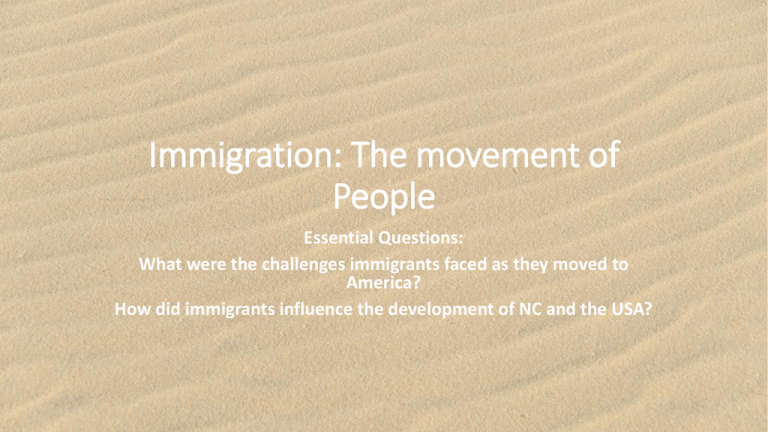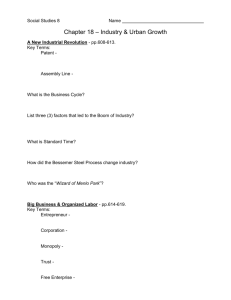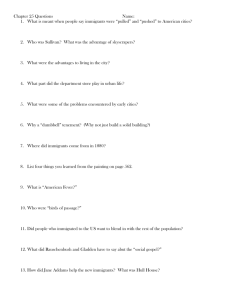Immigration: The movement of People
advertisement

Immigration: The movement of People Essential Questions: What were the challenges immigrants faced as they moved to America? How did immigrants influence the development of NC and the USA? Challenges: Prejudices Prejudice between Old Immigrants and New Immigrants: Nativism reborn • Immigrants before 1880’s from Northwestern Europe, predominantly Protestant • New Immigrants from southern and eastern Europe, predominantly Jewish & Catholic • War-torn regions like Italy, Greece, Poland, Russia, Croatia, and Czechoslovakia African Americans: segregated in Urban Ghettos • De facto segregation – Jim Crow Laws not in North but racism still issue Cultural Differences: Language, Religion, and Race • Many different languages • Catholic & Jewish vs. Protestant already here • Majority white so Chinese and Japanese did not look like “real Americans” Immigrants from Europe Old New New New Challenges: Cultural Differences • Language Barriers • Contributes to assimilation issues: new immigrants look for other of same national origin to live and work with • Creates lack of trust between ethnic groups both old and new • Religious Beliefs • Catholics feared because of concern over allegiance to Pope • Anabaptists – Germans that believed in adult baptism • Political Beliefs • German’s fleeing unification thought to be anarchists • Agricultural vs. Industrial: rural clashes with urban • New immigrants from old agricultural European heritage, clashes with urban-industrial characteristics of cities • New immigrants lack skills necessary for higher paying jobs Challenges: Quotas & Nativism Desire to limit amount of immigrants coming leads to creation of laws: • Chinese Exclusion Act 1882: response to economic fears of Chinese taking jobs causing recession • Immigration Act (Literacy Act) 1917: meant to limit number of undesirables entering • Specifically limit southern and eastern Europeans and Asians • Take reading test in English • Quota Law 1921 – 1924: • Limits immigrants to 2% of their national group in 1890 – target eastern, southern Europeans & Jews Ellis & Angel Islands: created to limit immigration by ‘screening’ immigrants • Ellis Island physical screening • Angel Island screening for “Paper Sons” • Approx. 75% of immigrants come thru Ellis Island Nativism: movement supported by white, American-born Protestants who believed the swelling tide of immigrants and, in particular, the rapid growth of Catholicism in the United States were harming the public welfare. Middle- and upper-class citizens felt the majority of European immigrants were uneducated and would not be able to contribute to American society. Challenges: Living & Working Conditions • Tenement Housing: • Dumb-bell shaped construction, thinner in center allow for light & air • Garbage and waste – greater disease (cholera, tuberculosis) and fire easily spreads • Low wages: • Cycle of poverty leading to criminal elements: gambling, prostitution • Dangerous working conditions • Child Labor • Rapid urban growth: 1890NYC & Chicago hit million citizens • Poor services like sanitation & plumbing • Little to no water service Challenges: Living & Working Conditions • Creation of ‘Company Towns’ or Mill Towns • Gastonia, North Carolina – Loray Mill • Living community developed and built by the company • Company requires one worker for each room occupied • Influences child labor • If fired then kicked out of home Immigrant Influence of NC & USA: Labor Immigrants provided cheap labor – Companies could pay less • Used as strike breakers • Immigrant steelworkers were generally willing to put up with the long hours, hard, work, and bad conditions as long as they had steady employment. They were usually stuck with the dirtiest, hottest, most hazardous jobs. • Abundant cheap labor helped grow economy during industrialization Immigrant Influence of NC & USA: Cultural • “Melting Pot”: America was compared to soup where all the ingredients melt or mix together • Assimilation of new cultural groups achieved by offering “Americanization” through public education and learning the English language • Some immigrants had harder time than other accepting American culture Immigrant Influence of NC & USA: Rapid Growth of Cities Chicago – Polish immigrants New York City: Italians, Jewish, Irish, etc. (Ethnic neighborhoods) • Italians tended to live near others from same village in Italy • “Little Italy” neighborhoods found in most major US cities • Immigrants associate with neighborhoods creating own environment • Assist one another social issues – finding work, housing, food • Justice handled within • Italians – piasans • Irish - Molly McGuire African Americans “The Great Migration” • Former slaves move in great numbers from rural south to northern industrial cities • Push: sharecropping, tenant farming, poor harvests, Jim Crow laws, Racism • Pull: industrial jobs influenced by WWI, better pay, schools better, blacks could vote • Harlem Renaissance: Harlem in New York City destination for many African Americans • Cultural explosion of African American heritage: writers, poets, musicians, artists, scholars • Broke down racial barriers between young whites and African Americans • Reinforced pride among African Am.





